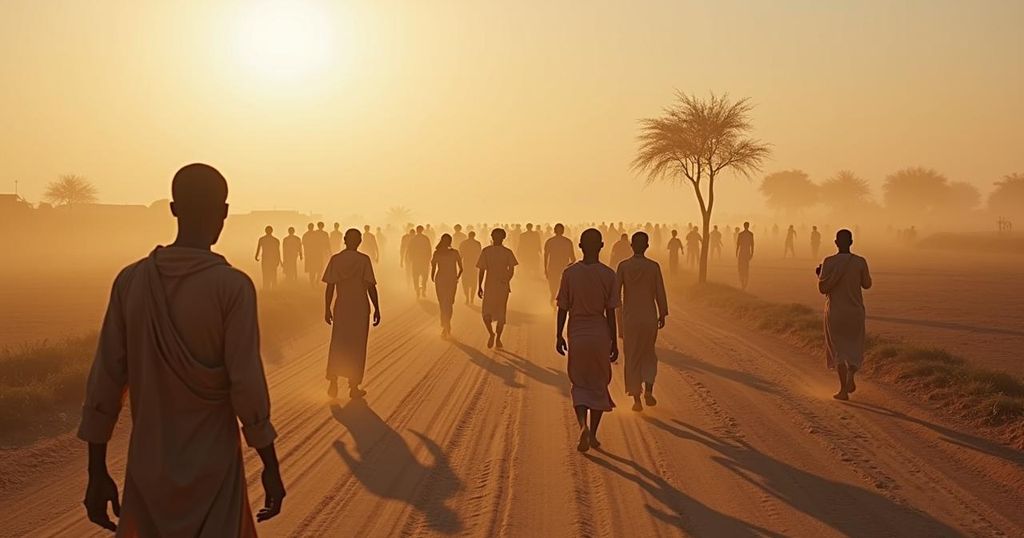The violent conflict in Sudan has led to nearly three million people fleeing the country, with over 25,000 crossing into Chad in early October 2024. The UN emphasizes the severity of the situation, calling for increased international support as Chad struggles to accommodate the influx of refugees. Current humanitarian assistance is significantly underfunded, hindering relief efforts as conditions deteriorate due to ongoing violence. There is an urgent need for sustainable solutions to integrate refugees and address their reliance on aid as the conflict continues.
The ongoing violence in Sudan has triggered a significant refugee crisis, as the number of individuals fleeing the nation nears three million due to relentless conflict and instability. In just the first week of October 2024, approximately 25,000 people, primarily women and children, have sought asylum in neighboring Chad, marking a steep increase in the humanitarian plight of these individuals. The United Nations has underscored the escalating nature of the crisis and expects the total refugee count to cross the three-million threshold imminently. The violent struggle, now escalating for over 18 months, disproportionately impacts civilians and has seen numerous allegations against the opposing forces, including war crimes and deliberate obstruction of humanitarian assistance. The ongoing confrontations between the Sudanese military and the paramilitary Rapid Support Forces have resulted in a catastrophic loss of life, with tens of thousands perished and around 26 million others facing severe food scarcity, particularly in southern Sudan’s remaining displacement camps. Chad currently shelters the largest number of Sudanese refugees relative to any other country, hosting 681,944 individuals. However, the country grapples with poverty and lacks the capacity to adequately support the influx of refugees, prompting calls for increased international aid. UN officials have reported that a mere 27% of the $1.51 billion appeal for support is currently funded. Ongoing conflict is expected to yield more refugees in Chad, exacerbated by deteriorating conditions due to the end of the rainy season. Despite some negotiation efforts aimed at unimpeded humanitarian access, progress remains hindered by various barriers. Further complication arises as the UN anticipates a continued flow of displaced individuals not only into Chad but extending towards Europe and other regions. In discussions regarding the refugee situation, UN representatives have advocated for sustainable solutions, including integration into local job markets to diminish reliance on humanitarian support. They emphasize that the quest for peace in Sudan remains essential to addressing these deep-rooted issues. As the crisis unfolds, the plight of Sudanese refugees is a dire reminder of the need for comprehensive international support and a resolution to the conflicts within Sudan.
The situation in Sudan has been dire since April 2023, with the ongoing war between the Sudanese army and the paramilitary Rapid Support Forces leading to widespread violence, loss of life, and a humanitarian catastrophe. The conflict has caused massive displacement, with millions seeking refuge in neighboring countries such as Chad, which has become a primary destination for those fleeing. The international community, particularly the United Nations, is closely monitoring this crisis, calling for increased funding and aid as conditions worsen in both Sudan and its bordering nations. The exploration of sustainable support mechanisms for refugees, including workforce integration, highlights the complexities surrounding humanitarian aid and development in the context of a protracted conflict. The ramifications of the conflict extend beyond immediate boundaries as it influences migration patterns towards Europe and other parts of the world, necessitating a broader examination of this emerging humanitarian crisis.
In conclusion, the humanitarian crisis stemming from the conflict in Sudan continues to escalate, particularly characterized by a significant increase in refugees fleeing into Chad. The international community faces urgent calls to ramp up support to address the challenges posed by this ongoing violence, with the need for financial assistance and sustainable solutions becoming increasingly critical. The situation remains fluid, and the continued cooperation and commitment of global stakeholders are vital to alleviating the conditions faced by displaced individuals and ultimately seeking a resolution to the underlying conflict in Sudan.
Original Source: www.barrons.com






